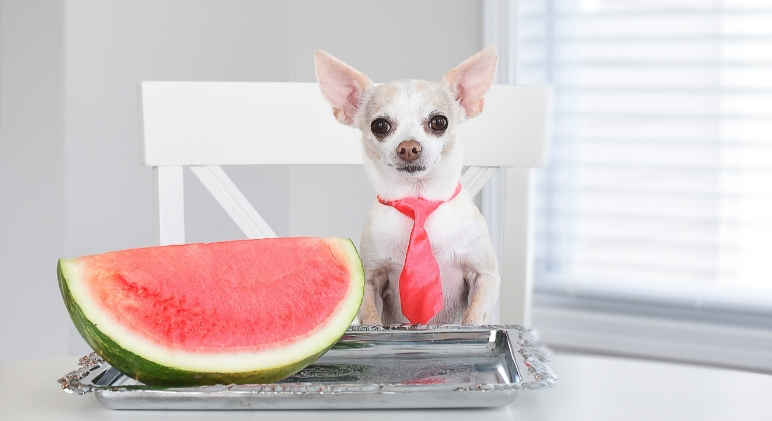Ever find yourself snacking on watermelon in the summer and gaze down at your dog? Do you ask yourself, “Can dogs eat watermelon safely?” Here’s the scoop. Dogs and watermelon mix just fine! Still, it’s not quite that simple. Shadowing this simple yes is a set of things to think about. In our next chat, we’ll explore why watermelon can be good for your furry friend. We’ll touch on any risks and give some tips on feeding them this juicy treat.
Understanding why Can Dogs Eat Watermelon
The humble watermelon is a fruit overflowing with nutrients, making it very beneficial for not just humans but dogs as well. Given its minimal calorie content and abundance of vitamins and minerals, it’s an excellent choice for a worry-free nibble. So, why exactly is watermelon a wise pick for your canine companion? Let’s explore:
- Hydration: Watermelon is about 92% water, making it an excellent way to keep your dog hydrated, especially on hot days.
- Vitamins and Minerals: Watermelon is a good source of vitamins A, B6, and C, all of which contribute to your dog’s overall health. It also contains potassium, which supports heart and muscle function.
- Antioxidants: The antioxidants in watermelon can help protect your dog’s cells from damage caused by free radicals, reducing the risk of chronic diseases.
Potential Risks of Feeding Watermelon to Dogs
Yes, Can Dog Eat Watermelon but here are some potential risks to be aware of
- Seeds: The seeds of watermelon can pose a choking hazard or cause intestinal blockages if ingested in large quantities. It’s best to remove all seeds before giving watermelon to your dog.
- Rind: The tough outer rind of the watermelon can be difficult for dogs to digest and may cause gastrointestinal upset. Avoid giving your dog the rind, and stick to the flesh of the fruit.
- Portion Control: Although watermelon is low in calories, it’s still important to feed it in moderation. Too much watermelon can lead to an upset stomach, diarrhea, or other digestive issues.
How Can Dogs Eat Watermelon Safely
To safely feed watermelon to your dog, follow these steps:
- Remove the Rind: Make sure to remove the rind completely, as it can be difficult for your dog to digest.
- Remove the Seeds: Carefully remove all the seeds from the watermelon to prevent any risk of choking or intestinal blockage.
- Cut into Small Pieces: Slice the watermelon into small, bite-sized pieces that are easy for your dog to chew and swallow.
Are There Any Dogs That Should Avoid Watermelon?
Dogs with Certain Health Conditions
Generally, watermelon is okay for many dogs, yet there are exceptions. Does your dog have any of these health conditions? Then, touch base with your vet before serving them watermelon:
- Diabetes: Watermelon contains natural sugars, which can affect blood sugar levels. If your dog has diabetes, it’s best to consult with your vet before offering watermelon.
- Allergies: Although rare, some dogs may have an allergic reaction to watermelon. If your dog has a history of food allergies, introduce watermelon slowly and watch for any signs of a reaction, such as itching, hives, or vomiting.
How Much Watermelon Should You Give Your Dog?
Portion control is key when feeding watermelon to your dog. Here are some general guidelines to follow:
- Small Dogs: Offer a few small cubes of watermelon as an occasional treat.
- Medium Dogs: A small handful of watermelon cubes is a reasonable portion.
- Large Dogs: Larger dogs can enjoy a bit more watermelon, but it’s still important not to overdo it.
Final Thoughts: Can Dog Eat Watermelon?
So, Can Dogs Eat Watermelon? Absolutely! Watermelon can be a fantastic, hydrating snack for your dog if given properly and not too much. It’s filled with essential nutrients and can freshen up your dog, especially in hotter weather. Just make sure you de-seed it, take off the rind, and cut it into easy-to-eat chunks. But remember, it’s a treat, not a meal replacement.
Read This New about : Can Dogs Eat Strawberries?
